East Asia
The East Asia Section of IR Insider publishes breaking news reports and analysis from China, North Korea, Japan, and other East Asian countries. Topics covered in the East Asia section may range from Inter-Korean relations to Chinese economic policy and beyond. Our section editor is Matthew Tsai.
Tensions between China and Taiwan have reached alarming heights as a surge in military activity from Beijing heightens the possibility of warfare. A key instigator is the 2024 election of Taiwanese President Lai Ching-te, who describes himself as a “pragmatic worker for Taiwan independence.” Lai’s election coincides with an exacerbation in Chinese aggression, including a 300 percent increase in military flights around Taiwan since May and a major October drill involving Chinese army, navy, air, and rocket forces that encircled the island. Most recently, in early November, over 35 Chinese military aircraft, including nuclear-capable H-6 bombers and drones, were detected flying to the south of Taiwan for two consecutive days.
In a historic move on Nov. 1, Japan and the European Union joined together in formalizing a security and defense partnership aimed at addressing growing problems within the Indo-Pacific region. The pact signifies a deepening relationship between Tokyo and Brussels, as both raise concerns over increasing Chinese influence as well as heightened Russian military aggression.
On Oct. 1, Japan’s new Prime Minister Shigeru Ishiba was sworn into office. Ishiba is a member of the ruling LDP (Liberal Democratic Party), the same party as previous Prime Ministers Fumio Kishida and the late Shinzo Abe.
British judge Nicholas Phillips has become the latest overseas justice to resign from Hong Kong’s Court of Final Appeal, stepping down on Sep. 30.
On Sept. 12, North Korea revealed a glimpse into their uranium enrichment facilities, boasting to the world the speed of their nuclear technology advancement despite the sanctions placed on them by the international community.
The United States’ strategy of export restrictions on computing chips has proven futile as Chinese companies find ways to circumvent these barriers. As China surges ahead with state-backed investments and open-source innovation, the U.S. risks losing its technological edge unless it reevaluates its approach in this escalating AI competition.
This past Wednesday, a Japanese warship sailed through the Taiwan Strait for the first time. Government officials reported to Yomiuri Shimbun that the JS Sazanami would complete exercises within the South China Sea, a territory contended between China and Taiwan.
On Tuesday, Sept. 24, Chinese government officials and the People’s Bank of China (PBC) announced a new fiscal stimulus package aimed at uplifting the decelerating Chinese economy and restoring faith in the nation’s domestic stock markets.
On April 14, Japanese Prime Minister Fumio Kishida sat down with CNN to discuss his upcoming summit with President Biden. During the discussion, Kishida discussed the rising tensions around the world as well as how Japan’s foreign policy is acclimating to the new geopolitical environment.
People across the world have already started eyeing the U.S. presidential race between Joe Biden and Donald Trump, but there’s another high-stakes election across the Pacific. On April 10, South Korea will elect a new National Assembly, the country’s 300-member unicameral legislature. The results will in large part indicate citizens’ satisfaction with President Yoon Suk Yeol, elected in 2022, and his conservative People Power Party (PPP), while also testing the mettle of the main opposition, the more liberal Democratic Party (DP), which seeks to keep Yoon from gaining momentum as it looks ahead to the 2027 presidential election.
On Tuesday, April 9, Chinese State Official Wang Yi hosted his Russian counterpart Minister Sergey Lavrov in Beijing for talks on economic and security cooperation. The new cooperative measures are set to displace American influence in Asia and Europe, the United States’ most strategically important region and former most strategically important region, according to political scientist and professor John Mearsheimer.
This week, U.S.-based credit rating agency Moody downgraded China’s economic outlook. Though not an official credit downgrade — China’s credit remains rated A1 — the news still carries heavy significance, as an outlook downgrade is generally the first step taken before credit is downgraded in the future.
“We three ministers agreed to restore and normalize three-nation cooperation at an early date,” stated the South Korean foreign minister, signaling a resumption of talks in 2024.
In a televised meeting on Thursday, plans for a 2024 unity ticket between two of Taiwan’s major political parties fell apart due to disagreements over which candidate would top the ticket.
On Friday, Dec. 1, China began new export restrictions on the key rare earth mineral of graphite. The new restrictions will require state approval for high-grade graphite exports to foreign nations.
At the Asia Pacific Economic Cooperation summit this weekend, all eyes were on the United States and China, but Xi Jinping was looking to shore up ties with another country as well: Japan.
On Nov. 15, Taiwan’s two main opposition parties in the 2024 presidential election agreed to a joint presidential ticket that may have serious implications for the outcome of the elections and the trajectory of Taiwan. The landmark election will take place on Jan. 13, 2024, and may alter Taiwanese independence for decades to come.
On Wednesday, Nov. 15, US President Joe Biden hosted Chinese President Xi Jinping at the Filoli Estate in San Francisco for a four hour one-on-one discussion. The meeting comes amidst the backdrop of this year’s Asian-Pacific Economic Cooperation (APEC) Summit where leaders from twenty-one Asian-Pacific nations gather to discuss economic cooperation and trade integration.
A patriarchal agenda dominated China’s 13th National Women’s Congress this year. The Congress, held every five years, has largely symbolized the Chinese Communist Party’s dedication to gender equality and women’s rights.
As threats loom and energy resources grow scarce, Japan and South Korea find themselves increasingly pushed together - despite their historical animus.
For the first time in twenty-five years, Foreign Direct Investment (FDI) into China has fallen below zero. That is, there is more capital currently leaving China for other markets, than there is foreign capital being invested into China, a phenomenon called capital outflow.
As Ukraine struggles to keep the world’s attention on its struggle against Russian forces, one country has seemingly continued to pay attention: North Korea.
On Sunday Oct. 21, Japan, South Korea, and the US conducted their first joint aerial exercise near the Korean Peninsula. The exercise comes on the heels of revived tensions between North Korea and its two Northeast Asian neighbors, as well as continued efforts to soften South Korean-Japanese relations due to the growing threat of China.
For years, Japan’s imperial family has struggled to find heirs. Now, the Japanese government hopes to reform the system, and in doing so, preserve a lineage that claims to have stood for over 2,000 years.
China continued its push for an alternative international environment at the third Belt and Road Initiative forum this past week. The conference took place from October 17 to 18, hosting two dozen world leaders and delegations from more than 100 countries, where they discussed the global infrastructure and development endeavor that began a decade ago.
In 1965, China became the first non-Arab nation to forge ties with the Palestinians. A couple decades later in 1988, China officially recognized Palestinian statehood.
Last year’s assassination of the Japanese former Prime Minister Shinzo Abe launched a year-long examination into the Unification Church, ending on Friday, October 13, 2023, with the Japanese government officially asking the Tokyo District Court to legally dissolve the Church.
Countries all around the world are watching the war between Israel and Hamas — and Taiwan is no exception.
On Tuesday October 10, 2023, Chinese state media announced the CCP’s plan to conduct a nationwide survey to “monitor China’s population developmental changes and provide a basis for the Communist party… to formulate… population related policies.” The survey comes as China begins to see its long-growing population begin to shrink for the first time in six decades.
China’s national consumption and sales of enterprises have rebounded and grown at astounding rates.






























